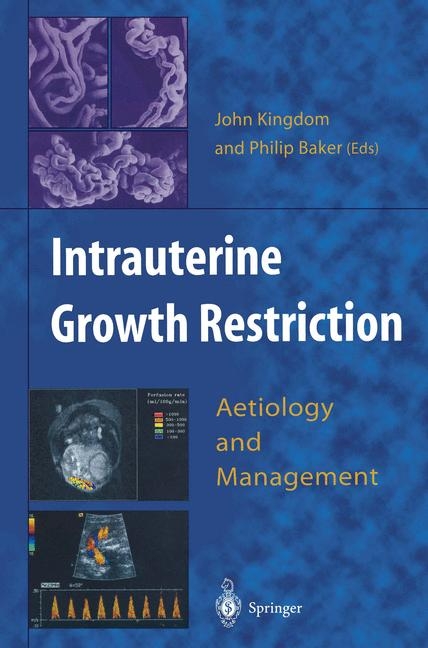
Intrauterine Growth Restriction
Springer London Ltd (Verlag)
978-1-85233-191-7 (ISBN)
- Titel ist leider vergriffen;
keine Neuauflage - Artikel merken
1. Definitions of Intrauterine Growth Restriction.- Approaches to the Recognition and Measurement of IUGR.- References.- Section 1 Aetiology and Pathognesis.- 2. Genes, Chromosomes and IUGR.- Chromosome Abnormalities.- Confined Placental Mosaicism and Uniparental Disomy.- Syndromes.- Conclusions.- References.- 3. Perinatal Viral Infections as a Cause of Intrauterine Growth Restriction.- Properties of Viruses and their Replication.- Cytomegalovirus.- Rubella.- Varicella-Zoster Virus Infection.- Human Immunodeficiency Virus.- Conclusion.- References.- 4. Therapeutic Drugs, Recreational Drugs and Lifestyle Factors.- Therapeutic Drugs.- Recreational Drugs.- Lifestyle Factors.- Conclusion.- References.- 5. Studies of Fetal Growth in Animals.- Determinants of Fetal Growth.- Experimental Measurement of Fetal Growth Rate.- Animal Models for Studying Fetal Growth.- Duration and Severity of Insult.- References.- 6. The Uteroplacental Circulation: Extravillous Trophoblast.- Cell Adhesion Molecules and the Extracellular Matrix.- Adhesion Molecules in Trophoblast Invasion.- In Vivo Studies Suggest CTB Invasion is Associated with Switching of Integrin Repertoires.- In Vitro Studies also Suggest that CTB Invasion is Associated with Switching of Integrin Repertoires.- Invading CTB Expresses Endothelial CAMs.- CTB Invasion, CAMs and Pre-eclampsia.- Oxygen Tension, CTB Proliferation and Adhesion Molecules.- Proteinases, Inhibitors and Activators.- Growth Factors, their Receptors and Proto-oncogenes.- Nitric Oxide.- Gap Junctions and Connexins.- Human Chorionic Gonadotrophin.- Activins and Inhibins.- The Major Histocompatibility Complex.- Blood Group Antigens.- Proliferative EVT.- Routes of Trophoblast Differentiation.- Conclusions.- References.- 7. Villous Development and the Pathogenesis of IUGR.- Development of Placental Villi.- Villous Maldevelopment in IUGR.- Summary.- References.- 8. Growth Factor Regulators of Placental Angiogenesis.- Vasculogenesis.- Branching Angiogenesis.- Non-branching Angiogenesis.- Angiogenic Growth Factors and their Receptors.- Effects of Oxygen on Placental Development.- Conclusions.- References.- 9. Placental Transfer and Intrauterine Growth Restriction.- Basic Concepts of Placental Transfer.- Fetal Asphyxia.- Placental Oxygen Transfer and Hypoxaemia in IUGR.- Carbon Dioxide Transfer and Hypercapnia in IUGR.- Placental Proton Transfer and Acidosis in IUGR.- Placental Glucose Transfer and Hypoglycaemia in IUGR.- Placental Amino Acid Transfer and Hypoaminoacidaemia in IUGR.- Drug Abuse, Placental Transfer and IUGR.- Conclusions.- References.- 10. Placental Pathology.- The Small for Gestational Age Infant.- Placental Size.- Gross Abnormalities.- Histological Abnormalities.- Maternal Perfusion.- Fetal Perfusion.- Cytogenetic Abnormalities.- Conclusions.- References.- Section 2 Clinical Management.- 11. Ultrasound Assessment.- The Normal Length of Pregnancy.- Assessment of Gestational Age: LMP, Ultrasound, or Conception?.- Commonly Used Ultrasound Measurements.- Precision of Ultrasound Measurements.- Appropriate Reference Ranges.- Assessment of Fetal Size.- Assessment of Fetal Growth.- Predicting the Small Infant by Biometry.- Predicting Adverse Outcome by Biometry.- Screening for Malformations.- Placental Morphology.- Amniotic Fluid.- Doppler Ultrasound Velocimetry of the Fetal Circulation.- Screening by Uterine Artery Velocimetry.- Conclusions.- References.- 12. Biochemical Markers of Fetoplacental Growth Restriction.- Alpha Fetoprotein.- Human Chorionic Gonadotrophin.- AFP, hCG and Other Risk Factors.- Other Biochemical Markers of Fetoplacental Growth Restriction.- Conclusions.- Acknowledgements.- References.- 13. Diagnosis and Management of IUGR.- Differential Diagnosis of SGA.- Is the Fetus Potentially Viable?.- Viable Early Onset “Placental IUGR”.- Late Gestation “Placental IUGR” (> 35 weeks).- When is an Attempt at Vaginal Birth Futile?.- What to Do at Delivery.- Postnatal Role of the Obstetrician.- References.- 14. Management of Late Gestation IUGR: Induction or Caesarean Section?.- Outcome of Labour in the SGA Fetus.- Antepartum Tests and Outcome of Labour.- Induction of Labour.- Caesarean Section.- Conclusions.- References.- 15. Coexistent Maternal Disease and Intrauterine Growth Restriction.- The Association of Pre-eclampsia with Intrauterine Growth Restriction.- The Association Between Maternal Thrombophilias and Intrauterine Growth Restriction.- Conclusions.- References.- 16. Prevention and Treatment of IUGR.- Antenatal Care.- Antenatal Treatment.- Conclusions.- References.- 17. Management of Antepartum Fetal Death.- Obstetric Management.- Investigations.- After Delivery and Follow-up.- References.- 18. Paediatric Implications - Neonatal Complications.- Immediate Condition at Birth and Resuscitation.- Mortality.- Specific Neonatal Conditions.- The SGA Term Infant Without Risk Factors.- Metabolic Adaptation.- Necrotising Enterocolitis.- Respiratory Distress Syndrome.- Neurological Effects of Fetal Growth Restriction.- Other Problems Encountered in Preterm Infants.- Growth over the First Year.- Conclusions.- References.- 19. Paediatric Implications of IUGR with Special Reference to Cerebral Palsy.- Criteria for the Inference of IUGR.- Potential Confounders in Studies of the Association Between Paediatric Outcomes and Measures of Growth.- Studies Investigating Associations Between Paediatric Outcomes and IUGR.- Conclusions.- References.- 20. Long Term Implications for Adult Health.- The Concept of Programming During Early Development.- Fetal Growth and Adult Cardiovascular Disease.- Metabolic and Endocrine Disease.- Mechanisms Linking Fetal Programming with Adult Disease.- Effects at Different Stages of Development.- Influences Underlying Fetal Programming.- The Future.- References.- Section 3 Future Advances.- 21. Molecular Regulation of Placental Development.- Stages of Placental Development in Mice and Men.- Potential Origins of IUGR During Placental Development.- Molecular Control of Placental Development.- Finding the Molecular Targets in the IUGR Placenta.- Conclusions.- References.- 22. Towards Evidence-based Management.- The Evidence.- Effective Treatment.- Clinical Trials.- Trials of Therapy for Fetal Growth Restriction.- The GRIT Study.- Applying the Evidence to Individual Patients.- Appendix: Useful Addresses for Reviewers.- References.- 23. The Internet and Medicinev.- Medical Informatics and the Modern Physician.- The Internet.- History of the Internet.- Anatomy of the Internet.- Websites.- References.
| Erscheint lt. Verlag | 1.3.2000 |
|---|---|
| Vorwort | M. Whittle |
| Zusatzinfo | XXII, 434 p. |
| Verlagsort | England |
| Sprache | englisch |
| Maße | 155 x 235 mm |
| Gewicht | 1000 g |
| Themenwelt | Medizin / Pharmazie ► Medizinische Fachgebiete ► Gynäkologie / Geburtshilfe |
| Medizin / Pharmazie ► Medizinische Fachgebiete ► Pädiatrie | |
| ISBN-10 | 1-85233-191-7 / 1852331917 |
| ISBN-13 | 978-1-85233-191-7 / 9781852331917 |
| Zustand | Neuware |
| Haben Sie eine Frage zum Produkt? |
aus dem Bereich


